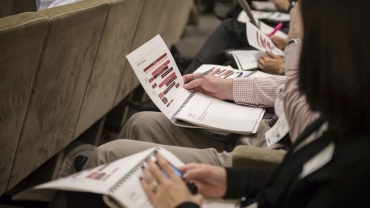
A total of 88% of employees surveyed assess the quality of education on air pollution prevention in Poland as insufficient
01/12/20
Smog can do more damage to health than COVID-19 in the long run – this is the opinion of as many as 52% of respondents who participated in the PwC survey preceding the launch of the third edition of the ‘Business vs Smog’ educational programme. While 75% of respondents expect their employers to be actively involved in the fight for clean air, 61% of them have considered or are considering changing their place of residence and work due to poor air quality.
The ‘Business vs Smog’ programme, whose third edition was launched this autumn, is a PwC initiative, and is operated in cooperation with 26 companies under the auspices of Krakow Smog Alert and the ASPIRE Association and under the honorary patronage of the Ministry of Climate and Environment. The objective of the project is to set up an employee volunteer programme for educating children and young people about smog and air purity. Volunteers, trained in terms of factual knowledge by Krakow Smog Alert, conduct training sessions (during this edition – mostly remotely) in schools and kindergartens throughout Poland. The programme is adapted to different age groups and the participants can learn what smog is, why it occurs, what dangers it poses to human health and life and what can and should be done to breathe cleaner air. All the workshops are free.
A total of 530 volunteers from the companies involved conducted a total of 1,150 workshops for 28,000 children and teenagers during the two previous editions of ‘Business vs Smog’. The programme was awarded the title of Benefactor of the Year 2020 in the Ecology category and was selected as the TOP CSR Initiative in Poland at the CEE Business Services Awards gala that took place in January 2019.
In total, 29 organisations are taking an active part in the third edition of the programme: ABB, Airly, Akamai, Amer Sports, Amway, Aon, ASSA ABLOY, Grupa CANPACK, Capita, Cisco Systems, Credit Suisse, Ecolab, Euroclear, Herbalife, Hitachi Vantara, HSBC, IAG GBS, Jacobs, Krakowski Alarm Smogowy, Maxima Europe, Oanda, Ocado Polska, UBS, PerkinElmer, PwC, Sappi, State Street Bank Polska, Stowarzyszenie ASPIRE and Zurich Insurance Company Ltd.
Since its first edition, the “Business vs Smog” programme has attracted growing interest from companies that join the initiative as well as schools and kindergartens that want to organise training sessions at their facilities. Education is the first and perhaps the most important step in the fight for clean air – by learning about the effect of our actions on the environment, we are able to shape proper pro-environmental behaviour. I am happy that our initiative unites so many companies, proving that corporate social responsibility is best achieved through cooperation’.
The results of the survey conducted by PwC on a group of 2,276 employees from the companies involved in the ‘Business vs Smog’ programme demonstrate that there is a great need for educational projects on clean air. According to 69% of the respondents, the quality of the educational system in terms of air pollution prevention in Poland is insufficient and 19% find it very poor. In the opinion of 88% of those surveyed, the actions of public stakeholders aimed at improving air quality in the city/region are inadequate.
The fact that smog is an important topic for employers is supported by the question on the willingness to change the place of residence or work due to poor air quality – this option is or was considered by 61% of respondents. In addition, 75% of employees surveyed say explicitly that they expect their employer to actively engage in activities to counteract the deterioration of air quality in Poland.
The results of the PwC survey convey a clear message to employers that everyone needs to join the fight for clean air. Therefore, I am all the more pleased that so many ASPIRE member companies joined the initiative. This can lead to even better outcomes for our joint activities.
PwC also asked the respondents to assess the long-term health effects of particular phenomena, which as a society we currently face. While 52% of those surveyed identified smog as the most severe phenomenon in terms of damage to health, 40% chose climate change and 8% rated COVID-19 as possibly having the worst consequences.
The air quality in Poland is still very poor. A recently published report by the European Environment Agency shows that Poland has the highest concentrations of benzopyrene in the entire European Union, and one of the highest concentrations of dust. Apart from legal regulations and financial programmes, raising awareness is the most important task to improve air quality. We hope that greater awareness of children will also lead to increased knowledge of parents and their motivation to take action that will contribute to improved air quality. In Poland, approx. three million houses are still heated by outdated coal- and wood-fired boilers that emit large amounts of pollutants. More than 80% of the coal burned in EU households is burned in Poland. If we want to breathe clean air, this has to change, and education and reliable information could have a considerable impact on the millions of decisions made in this area.
Subscribe for a newsletter
Stay up to date with the latest news
Contact us




